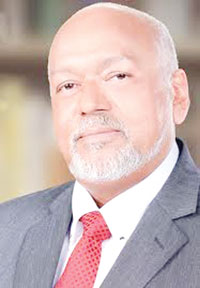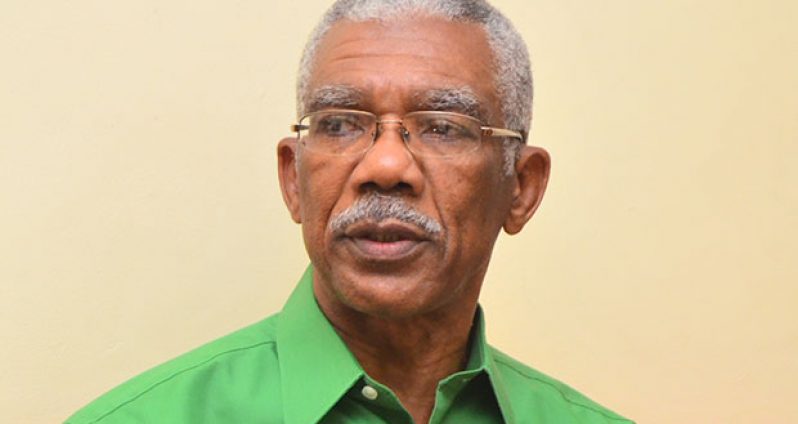“GROSSLY UNDER-RESOURCED” and “under-funded” were terms used by Brigadier (rtd) David Granger to describe the current’s Administration support to the disciplined services, in particular the Guyana Defence Force (GDF) and the Guyana Police Force (GPF).However, former president, Dr Bharrat Jagdeo, maintains that truth cannot be changed, as much as attempts are made to “elevate rumours to truth,” and the record of successive People’s Progressive Party/ Civic administration’s (PPP/C) support for the disciplined forces are a matter of public record.

In a public missive to ranks of the disciplined services, published in the local dailies yesterday, the retired Brigadier charged that the lack of resources have led to a situation where “crime and incompetence” have taken a toll on the Guyanese people’s quality of life.
On a platform, an interview that was done on Thursday and subsequently made public, he said, “I have no doubt that within days of getting into office we will be bring about changes, we will be able to set up a commission to review their salaries, we will be able to determine based on studies that were conducted 11- 15 years ago what improvements need to be made, I am aware of some of the problems myself and I reckon that the servicemen could look forward to progress within days.”
GRANGER EXPOSED
These “empty promises,” according to Dr Jagdeo has exposed the duplicity of the alliance of A Partnership for National Unity and the Alliance For Change (APNU+AFC).
At a prior news conference, he slammed the APNU+AFC alliance for their “sudden love” for the military.“When he [Granger] was there he did nothing for the army,” Dr Jagdeo stressed.
He added, “Let the numbers speak for itself.” The one-line defence was mounted by the former president as he also waded into the political Opposition for its “opportunistic” profession of support for Guyana’s armed servicemen and women.
Producing a copy of the 1992 Budget, done under PNC finance minister Carl Greenidge, he pointed to the dismal level of resources that were allocated to the Guyana Defence Force (GDF).
According to him, in 1990, the amount allocated for capital expenditures was a miniscule $300,000, while in 1991 it was 675,000, and then upped to $7M in 1992.
“Greenidge presented this to the Parliament. This is not the PPP…today they love soldiers so much and say that we discriminate against soldiers and that we are not doing enough and this is their record, shameful,”the former president said.
Presently, Dr Jagdeo charged that the annual salary of a private amounts to more than the annual capital expenditure in 1990. “You can check it yourself. Ask Greenidge about it…ask Granger, because he was national security advisor at the time,” he charged.
Fast forwarding to 1999, the former president disclosed that the total budgetary allocation for the GDF was a whopping $1.5B, which was consistently increased to $6.6B – a $5.1B increase in the years that he was commander-in-chief.

“In the last five years alone, it [the allocation to the GDF] was 2,000 times more than the capital budget [in the 1990s]…these are the men that so love the army today, but their record does not prove that,” Dr Jagdeo said
He added that the officer corps and the non-officer corps, as well as the prison, fire and police servicemen and women also benefited from other programmes through which they received skills training or higher- level education.
REALISTIC GOALS
Meanwhile, People’s Progressive Party/ Civic (PPP/C) presidential candidate and incumbent Head of State, Donald Ramotar, in an earlier letter to disciplined services ranks made it clear that while there has been improvement, there is also room for improvement.
“I am aware that there is much scope for improvements in terms of all three organisations that comprise the disciplined services,” he said.
Guyana 2.0, the PPP/C pact with the Guyanese people and vision for the future, stated that: “Over the years, successive PPP/C Governments have pursued the objective of strengthening the security and judicial sector, with significant success. In the area of policing and the criminal justice system, the PPP/C will continue to focus on people’s experiences of insecurity and injustice.”
As such, an extensive list of commitments made include: providing resources and support for a professional army, while expanding its reserves;completing and implementing the Security Sector Strategic Plan of the Guyana Police Force; improving partnerships in the security system to ensure the criminal justice system works effectively and efficiently through collaboration with the Director of Public Prosecutions (DPP) Chambers and the Judiciary; strengthening, monitoring and legislative reforms to tackle robberies, burglaries, piracy, hijacking, trafficking of persons and abductions; expanding the use of technology for intelligence- gathering, investigations and data/case management; maximizing the use of the modern forensic laboratory to improve forensic and scientific approaches to investigations and partnering with similar institutions in other countries in a common approach to reduce crime and protect the Caribbean region; enhancing the rehabilitative programmes at our prisons with emphasis on training for staff and offenders; collaborating with external partners to control organised crime by using special agencies such as the National Intelligence Committee (NIC), Specially Organised Crime Unit (SOCU) and Customs and Anti-Narcotics Unit (CANU); establishing a National Emergency Centre (911 System) that can be accessed 24 hours daily; reducing the Average Police Response Times to 15 – 30 minutes; establishing a “neighbourhood watch” programme. The goal of this programme is to increase surveillance by residents and community members of their own neighbourhoods; and introducing a problem- oriented approach to addressing crime called POP (problem-oriented policing) with the police taking a proactive role in identifying, understanding, and responding to problems – not just incidents in their communities, among several others.
“I want to assure you of my unwavering support going forward, as together we strive to improve the capabilities of your respective organisations and the well-being of their officers and other ranks,” President Ramotar assured.




.png)









